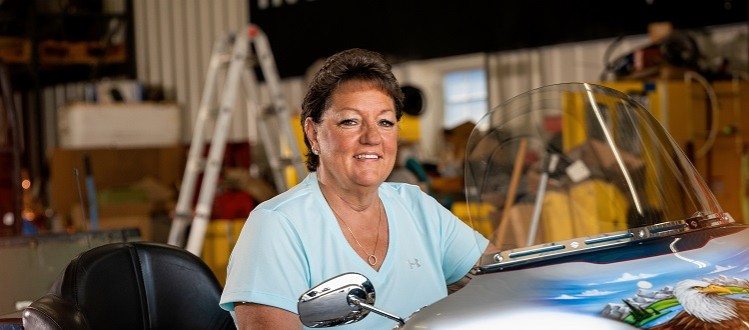The combined efforts of a routine screening and an attentive surgical team allow a patient to ride off into the sunset of a cancer-free life.
Digestive issues have been the norm for me since I was six years old,” shares Kathy Greene, a Carroll Hospital patient who discovered she had colon cancer in early February 2020 after a routine colonoscopy. “I wasn’t aware I had symptoms; that colonoscopy changed everything.”
After the initial diagnosis, Greene planned for a laparoscopic surgery at the end of the month with Carroll Health Group general surgeon John Steers, M.D., to remove the cancer. However, her visit to the operating room came sooner than expected. “Dr. Steers prepared me for the possibility of an obstruction,” shares Greene.

“While I was hoping for a minimally invasive procedure, a total blockage occurred—I was immediately brought in for emergency surgery just days after my appointment.” What Greene was experiencing was a complete bowel obstruction, meaning the contents of her colon could not pass through her digestive tract. “The pressure on the walls of her colon made it unsuitable for laparoscopic surgery,” explains Jay Mittal, M.D., the Carroll Health Group general surgeon who was on call during Greene’s emergency. “When the bowels are extremely dilated, there’s no room to work.”
Dr. Mittal was forced to perform an open procedure—requiring a cut from Greene’s diaphragm to her pelvis. While the sudden surgery and doctor switch-up was not what Greene had in mind, her experience with Dr. Mittal and his team exceeded any expectations.
“From his bedside manner to his attentiveness, Dr. Mittal made me feel like a top priority every step of the way,” says Greene. “He checked on me whenever he could, and his team took the time to walk my family through important care steps, like how to change my ileostomy bag.”

In June 2020, after reversing her ileostomy, a small leak was found in Greene’s small intestine. Fortunately, Dr. Mittal knew exactly how to act, prescribing antibiotics and a strict no eating or drinking regimen. “It’s important for a surgeon to know when to operate and when not to operate,” says Dr. Mittal. “Sometimes it’s about finding the best method of recovery for the patient.”
After several days in the hospital, and letting her body rest, Greene was discharged with a mended intestine. “Dr. Mittal did what was necessary to help me recover,” she says. “The communication was there, and it made all the difference.”
Positive experiences like Greene’s are enhanced by the hospital’s state-of-the-art surgical facilities, which are currently expanding to include a new, streamlined preand post-operative surgical unit. But in the end, it’s the hospital’s unique combination of surgical expertise, caring culture and unmatched dedication that make the biggest difference. “I never thought I’d find the perfect place to practice medicine, but I have found it here,” says Dr. Mittal. “Everything is so patient-focused because we know they’d do the same for us given the opportunity.”
Best of all, Greene did not require cancer treatment after her surgery and recovery. Now she’s back to doing things she loves, like spending time with her grandchildren, going on weekend camping trips and riding her motorcycle. “From my diagnosis to my procedures to my follow-up appointments, I don’t have a single bad thing to say about Carroll Hospital,” shares Greene. “My one bit of advice—schedule the screening. It could save your life.”
Watch a video interview with Dr. Mittal
From the summer 2021 issue of A Healthy Dose magazine
